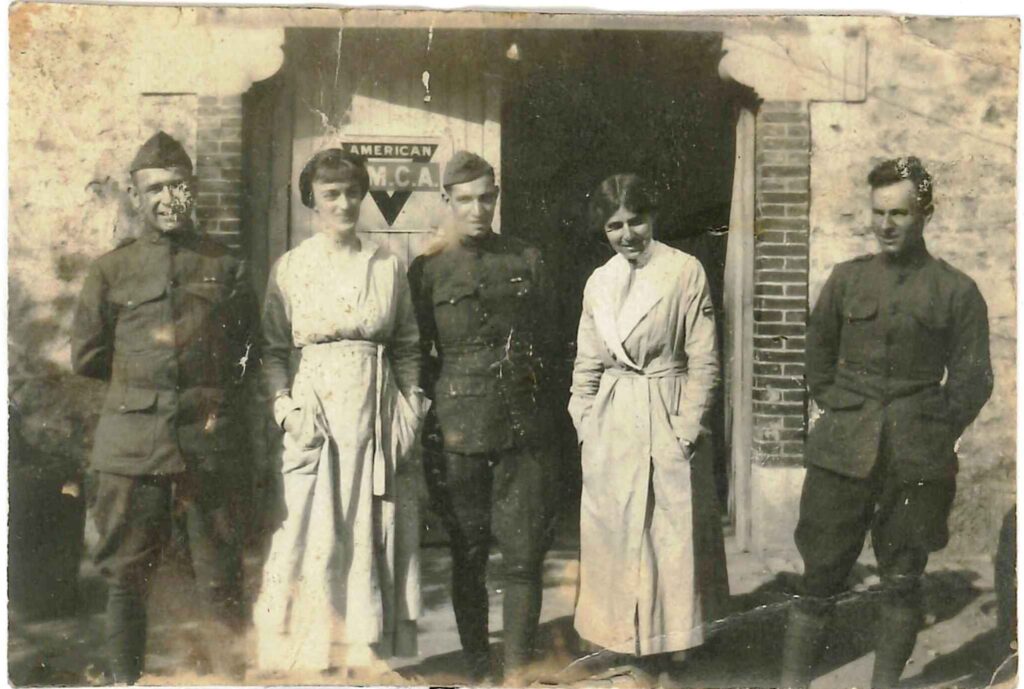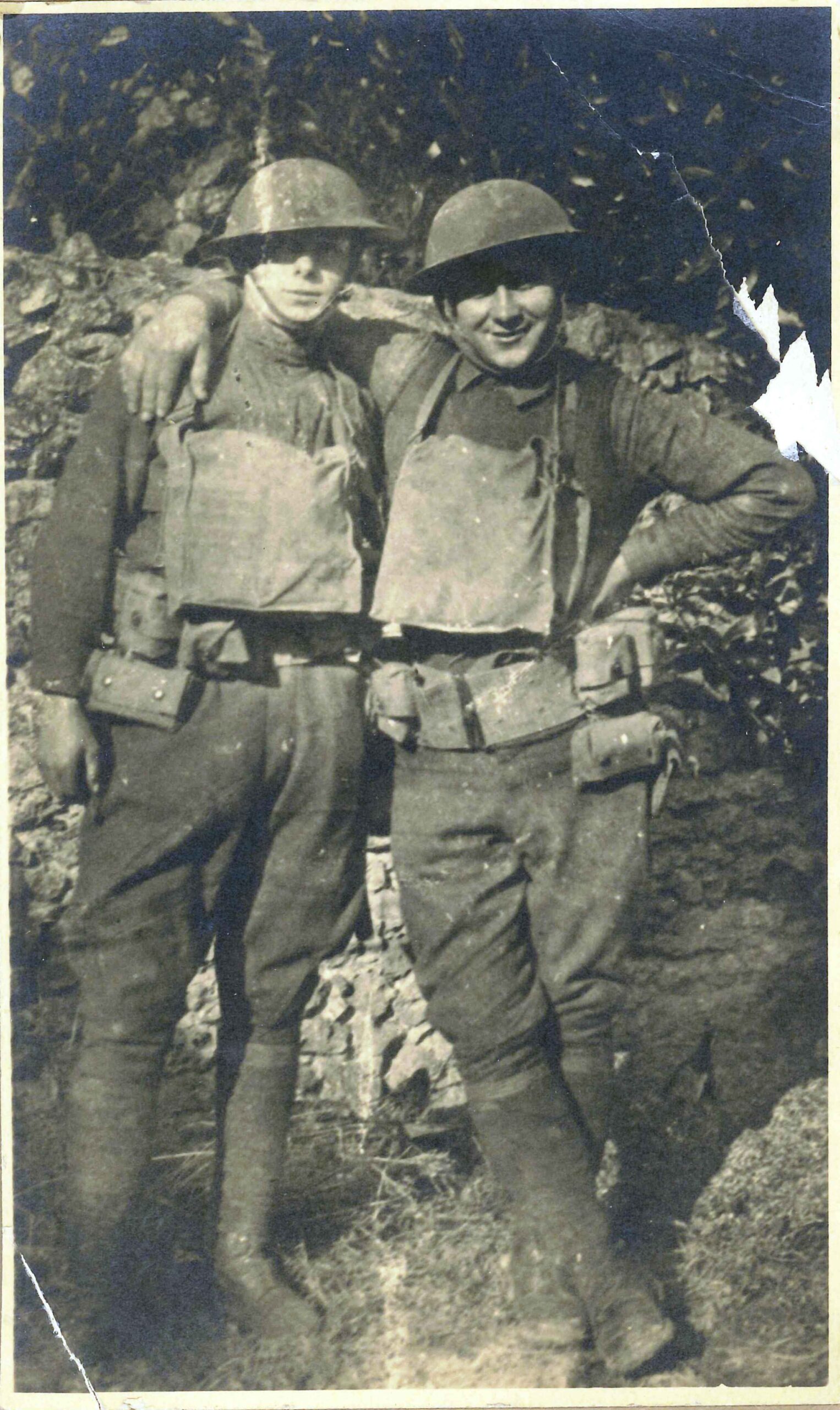World War I — May 1918, the smells of spring … and gas

Today we are going back to the War to End All Wars. May 1918 brought warm breezes and the sweet smell of spring. It also brought notices in the mail that more young men would be needed “over there.”
Those who had enlisted months earlier came home to experience just a few days in those warm breezes. Meanwhile, those who were already over there found a little time to stop and smell the roses.
Early in the month, we read of the homecoming of one young man who had already served in combat: “Henry Weidling of the United States Navy, who was granted an eight days’ furlough and spent same here with relatives, returned to New York Sunday. He was accompanied as far as Chicago by his father, sister, Miss Tessie, and aunt, Mrs. A Grote.”
And a week later: “Case Van Duyne of this city, a soldier boy stationed at Camp Dodge, Ia., surprised his parents, Mr. and Mrs. P. Van Duyne, Wednesday by appearing at their home accompanied by his bride whom he had married in Des Moines, Ia., Tuesday last. Case was granted a weeks’ furlough and he got married and came home on a honeymoon visit.”
Also mentioned were the boys who had yet to put on a uniform: “Wednesday morning last 10 of Wilmington’ selected young men for the United States Army left here on the 5 o’clock train for Joliet to report for entrainment.
“They are Harry H. Butcher, Dennis D. Fitzpatrick, William Lacher, Thomas D. Nicholson, Thos. Peters, Geo. F. Testin, Howard A. Weber, and Wm. J. Horton, Peter Schutten. Those from nearby towns, who accompanied them were: Harry Singleton, Symerton; Harry A. Jacobson, Elwood; James Mortimer, James Genesick, Joseph Kratochvil and Antone Dauzaro of Braidwood.
“The young honor men passed through this city at 9 o’clock on a special train for Hattiesburg, Miss., where they will be entrained at Camp Shelby. A large number of citizens were at the depot to see the boys off, but the train did not stop but went through here at a 50 mile an hour rate.”
The folks who tried to see their young men off must have had trepidation in their heart. The headlines on the front page of the Advocate lately had been filled with news about the monstrous weapon that both sides were using – gas:
“With the American Army in France, May 23rd, The American artillery northwest of Toul launched a sudden and terrific local gas attack upon the German positions and cantonments within the Gerechamp wood early in the morning. Severe punishment was inflicted upon the enemy, how great is not yet known.
“The deluge of American shells fell in three waves and within a half-hour the woods in which it is known many Germans were sleeping had been drenched with a large quantity of poisonous gas.”
Young Ronald Jardine, stationed with the British at a hospital in France wrote home of his life during the month of May:
“Last Sunday having a whole day off, 3 of us decided to take a real walk. It was not raining when we started, but after we were well started it began to sprinkle, then it sprinkled a little harder and finally it rained, but we were not to be turned back. We walked right ahead and by the time we reached the first village (5 miles), it was church time and the French peasants (who do not look like peasants when dressed in their church togs) were heading for the old stone church in the center of the village.
“With the sound of the church bells in our ears we went ahead across the hills through the rain and reached another village flooded with Portuguese soldiers. By this time the rain had ceased. Walking further we came to a large forest extending north and south of the road. We did not spend much time here, but went on and struck a broad, well-built military highway, which had motor cars, motor lorries (trucks), motorcycles of all kinds We followed it and came to our destination, a city this time.
“It was altogether too important a place though, for the military police told us we had to get out. Well, we began to wonder where we were going to get something to eat if we had to get out. Before leaving we stopped in a little grocery store. We bought a bag of cookies, which proved to be very poor, for 5 francs, then we spotted a jam can with ‘Fraises,’ which is supposed to be strawberries.
“We walked out into the country into a little village, at 11:30. The lady in charge of a small establishment told us to come back at 12 pm. We expected a meal, but instead we found it a place of drinking only. We refused wine and ordered ‘citron,’ pronounced ‘seetrho.’ We strolled back to the outskirts of the city where we managed to get 3 eggs a piece, potatoes and some more ‘citron,’ which with our cookies and jam made a fair meal.
“We spent a long time in the woods which were in the height of their glory. Purple violets and some purple bell like flowers were the only flowers that had made their way through thick carpet of soft moss. The only flowers I could find to wear for Mothers’ Day was a pink apple blossom.”
Sandy Vasko is Director of the Will County Historical Museum & Research Center and President of the Will County Historical Society.

Lewis Herath and a pal relaxing during some down time.
